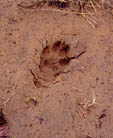What I've noticed here is that what the gardeners say is not quite right--many things are two weeks early, then some things are not. There was an article in Scientific American online a while ago about schedule changes, and how these will affect plants, insects, birds, and then all the rest of us: With Warming Climate, Only the Earlier Bird Catches the Worm. Starting from the more recent, Bird Extinction Estimates May Be Too Low at ScientificAmerican.com and following the links around to the various related articles, one comes to Not Just a Nice Idea, Preserving Biodiversity Is a Necessity:
According to a study published in today’s issue of Nature, preserving the earth’s biodiversity is not just a nice idea—it is necessary to ensure ideal functioning of the planet’s ecosystems.Global warming is a threat to biodiversity, because it, like any rapid change, is and will continue to press some species to extinction, while also being at least a temporary boon to others. "Ideal functioning," or ecosystem efficiency will be restored if relatively stable weather patterns are re-established. The danger is not to life on earth, but to extant species, of which human beings are one. It would be really interesting to see that rebalanced world, but, of course, unlikely that we will.
Charlie of Charlie's Bird Blog and his partner Jo have embarked on a new project: Hummingbird:
Welcome to Hummingbird - a blog that wants to say that there has to be a better way of doing things than throwing away hundreds of bars of soap a day...In the spirit of "Think globally, act locally," (although since they deal with the airline industry, local is pretty global!) they start with soap, move on to utensils (linking the site of the manufacturers of spudware, biodegradable knives, forks and spoons made of potato starch), compostables resulting from airline catering, and on investigating the possibilities of decreasing or balancing greenhouse gas emissions from air travel, and reducing its "footprint." I'll be watching their progress with interest.
I don't know if we're still at a point where we can turn back from the brink, but I'm convinced that if we are, there are choices we can make as individuals, including the choice to no longer tolerate waste, pointless extravagance, landfilling materials that can be diverted, etc., that will go a long way to fostering the change in political will necessary to making that turn.
For an interesting discussion of points of no return and climate, see Runaway tipping points of no return at RealClimate: Climate Science from Climate Scientists.





3 comments:
I've noticed quite a few things "ahead of schedule" this summer. The Brown Mantidflies showed up at least a week early.. actually maybe closer to two weeks. Upon our return home from Nova Scotia, I discovered that the Argiope aurantia spiders are already making big webs in the garden and their bodies are more like the size I see after about the first week of August. The grasshoppers are also large, which might explain the large size of the spiders as they seem to be the main food of the Argiope.
Pamela - After I posted my earlier comment, I received an email with a link to a website that I thought you might find it of interest. I subscribe to the Nova Scotia nature listserv and a few of the people have been discussing coast line preservation. The discussion turned to Piping Plovers and the impact that rising ocean levels will have on typical nesting habitat. This link was posted to a site where studies are and will soon be posted on coastal water level research. Apparently, there will be a paper on the Piping Plover situation posted quite soon. Here's the link. The map of the Maritimes sea-level change threat pretty much says it all.
http://atlantic-web1.ns.ec.gc.ca/slr/default.asp?lang=En&n=61BB75EF-11
Thanks for the link, Bev. I'm repeating it here as a hot link:
New Brunswick Sea-level Rise Project.
I've been wondering about coastal habitats, whether in some cases they'll be "pushed back," in others just gone for so long that the species that depend on them are out of luck. Interesting, scary.
Post a Comment